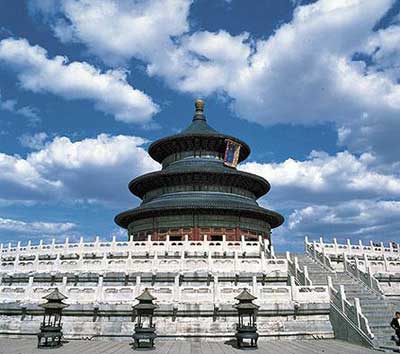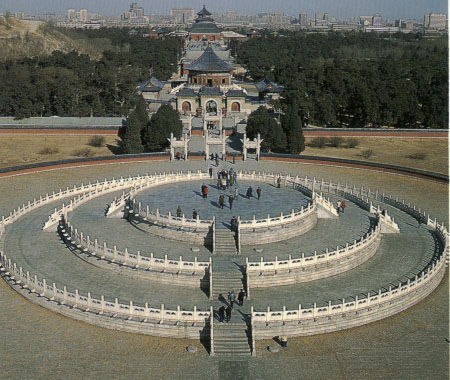Shang Ti / Shàngdì
“Shang Ti”, translates into English as "Supreme Lord" or "Lord Above." All things were made by Him, all punishments and rewards were ultimately traceable to Him. An examination of the traditions of those days when he was worshiped reveals a mixture of Spirit worship and acknowledgment of God not unlike that found in the Biblical kingdoms of Judah and Israel. 1
"The Heavenly Master" is a Taoist term denoting the governor, and judge of the world. He is also called the "Pearly Emperor" and is identified with "Shang Ti", the Lord on High. 3
Confucius (511-479 BC) remarked that regardless of whether God exists or not, his worship is good for the people. It was in his time that the more personal title “Shang Ti” was abandoned for the more impersonal label Tien (Heaven). Referred to as the Son of Heaven, a title that predates the Qin unification, the Emperor was recognized as the ruler of "All under Heaven".
Shang Ti (上帝, pinyin Shàngdì) is the phrase used to refer to God in the southern edition of the Chinese (Mandarin) Union Version of the Christian Bible. The Protestant missionaries in northern China in the early 20th century preferred the alternative 神 (pinyin Shén), and another edition was printed thus. Chinese Catholics used the term "tien chu" to address God.
Over the centuries, the Chinese departed from the worship of "Shang Ti" and adopted the ideas of Confucianism, Taoism, and Buddhism. Buddhism can be misunderstood by some; Buddhism and Confucianism are not considered to be a religion in the usual sense of the word, and it means different things to different people. Buddhist thought is considered to be more along the lines of philosophy, psychology, and psychotherapy; it involves an individual seeking to make character improvements deep within one's own self. The Buddhist philosophy is a form of spirituality which is directed to one's internal self; it is a way of living. Buddhism transcends the concept of religion and can, in many cases, enhance whatever religion one relates to because it is universal. Confucian thought involves a person striving to behave in a proper manner, or propriety within society. Nevertheless, each of these schools of thought can be considered different, yet excellent vehicles to help an individual to grow.
The first Christian missionaries to China arrived in the eighth century A.D. In the years that followed, instead of finding the common ground of the residual monotheistic witness already known in the land, missionaries (mistakenly) suggested a completely foreign name to the God of the heavens. The missionaries emphasized that the God of the Bible is foreign and completely distinct from any God the Chinese had ever heard of before. The missionaries who took this position quite possibly completely misunderstood the real situation, many having failed to find their common ground.
The ancient sages have much to contribute with regard to teaching virtue, civility, and ethics.
View a fascinating video biography about Confucius on the Video Page IV.
- "He who exercises government by means of his virtue may be compared to the north polar star, which keeps its place and all the stars turn towards it."
reference notes:
(1911).Monotheism. The Catholic Encyclopedia.New York: Robert Appleton Company.
Retrieved June 15, 2010 from New Advent:
http://www.newadvent.org/cathen/10499a.htm
2. Encyclopædia of Religion and Ethics, James Hastings, Trinity.
3. Suzuki, Teitaro and Carus, Paul. (1906) T'ai - Shang Kan-Ying P'ien Chicago, Ill. The Open Court Publishing Co. (This book, and a few other books by these two authors is available on the Free Buddhist ~ Taoist eBooks page.)
Retrieved June 15, 2010 from New Advent: http://www.newadvent.org/cathen/04223b.htm
5. Confucius Words of Wisdom Biography
A& E Television Networks, 1996, Available at Amazon.com


